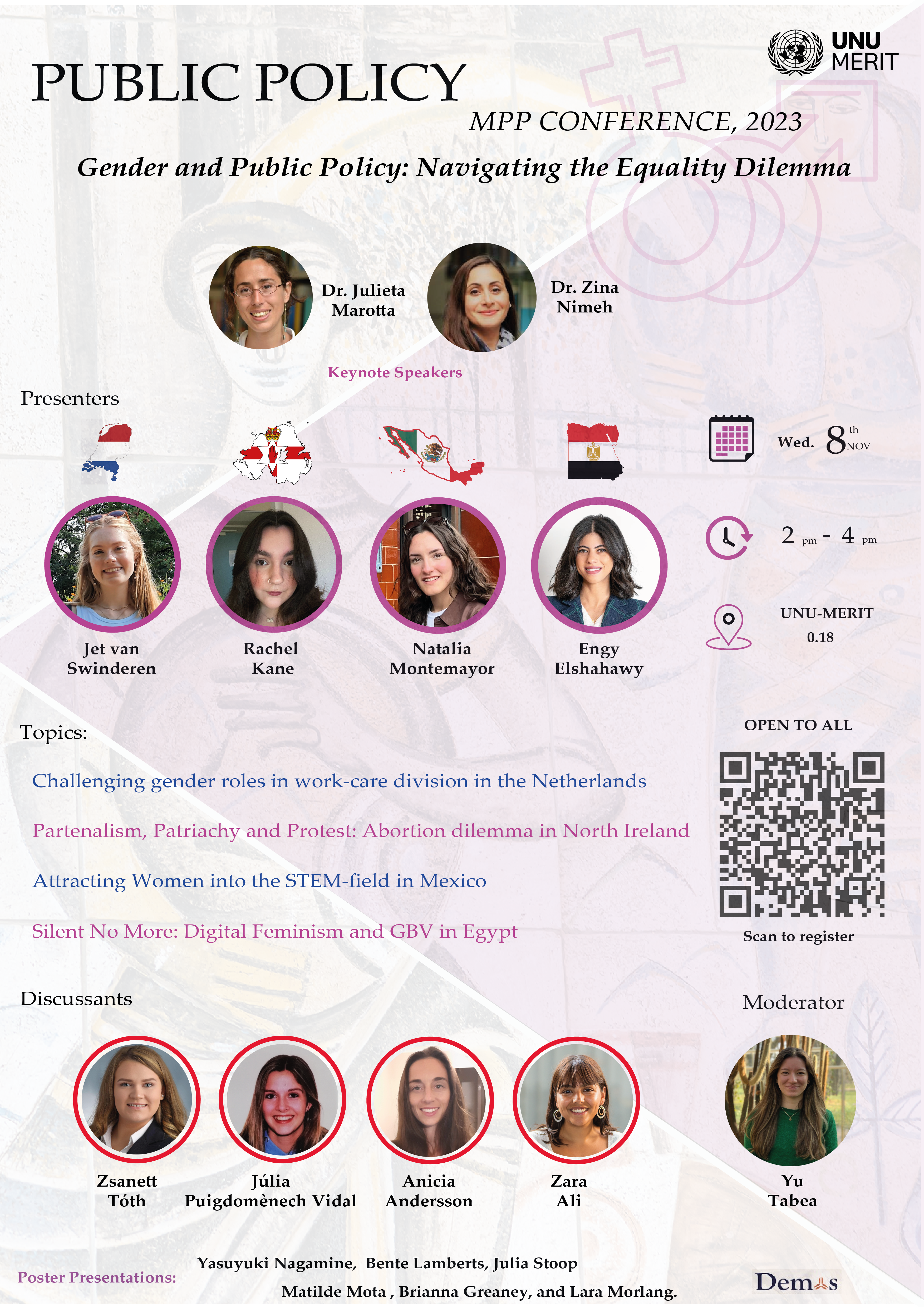Public Policy MPP Conference 2023 - Gender and Public Policy: Navigating the Equality Dilemma

On Wednesday 8 November at 14:00 - 16:00, UNU-MERIT will be hosting its annual Public Policy MPP Conference, which is a hybrid event open to anyone who would like to attend. This year's theme is 'Gender and Public Policy: Navigating the Equality Dilemma'.
Our keynote speakers are Julieta Marotta (acting director of our MSc in Public Policy and Human Development programme) and Zina Nimeh (Associate Professor of Social Protection and Public Policy), who will discuss their work and experiences around gender equality and public policy.
Furthermore, presentations will be held by our master's students on various topics related to the theme of this conference, including the following:
- Gender roles in work-care division in the Netherlands
In Dutch households, paid work and unpaid care for children are unequally divided along gender lines. Women often work part-time and take on the majority of the care for the children, whereas men work full-time. 73% of Dutch women work a part-time job, as opposed to 23% of men. Worse, two out of three mothers never return to the amount of working hours they had before becoming a mother.
Creating equal chances for women and men to divide work will get us closer to SDG 5 (Achieve gender equality and empower all women and girls). Jet van Swinderen will present the role of a non-governmental organisation (WO=MEN) to address the unequal work-care division.
- The abortion dilemma in Northern Ireland
The SDG 5 targets aims to ensure universal access to sexual and reproductive healthcare services and rights. The late twentieth century marked the commencement of Europe’s leading role toward the global liberalisation of abortion laws. However, while the political reform favouring reproductive rights was widely supported, this was not the case for all countries.
Rachel Kane will present a critical analysis of the pivotal role played by Amnesty International in influencing the developmental process of abortion policy in Northern Ireland.
- Attracting women into STEM in Mexico
Despite the well-known economic benefits of fostering women involvement throughout the third technological revolution, such inclusion can be seen as a fantasy-like reality. Gender stereotypes start in the early stages of females’ education due to teachers' and parents' expectations of gender-based behavior. Achieving gender equality (SDG 5), and promoting industry, innovation, and infrastructure (SDG 9) will require efforts beyond the government circles.
Natalia Montemayor will present an evaluation of how Movimiento STEM+ (an NGO) has focused on closing the barriers between women and men in the STEM industry in Mexico.
- Digital feminism in Egypt
Violent practices against women are widespread globally. These practices are evident in private and public spheres. With the pledge to achieve the SDGs, solving the issue of gender-based violence becomes of higher priority since it is directly linked to SDG 5 on the elimination of all forms of violence against women.
Engy Elshahawy will shed more light on the role of online advocacy in inducing policy changes concerning gender-based violence in Egypt.
---------------------------------------------------------------------------------------------------------------------------------------------
Finally, there will be interesting poster presentations capturing the essence of the complex issues surrounding gender and public policy.
We hope to see you there!
Practical details of the event
Date: Wednesday 8 November 2023
Time: 14:00 - 16:00 CET
Location: Room 0.18, UNU-MERIT (Boschstraat 24, Maastricht) and online
To join on Zoom, click here.
Secure your spot by registering for this event here.
Background about the conference
In our Public Policy and Human Development master's programme (known as MPP for short), one of our goals is to train our students to address critical societal issues.
True to this goal, the first assignment that our students are given requires them to:
1) identify a policy problem in their home country;
2) analyse how actors are (successfully or unsuccessfully) influencing the selected policy problem, and
3) propose practical recommendations.
This is not just any assignment - the output from our students forms the basis of our annual Public Policy MPP Conference. Interesting topics from the submitted assignments are selected and students present their topics in an open academic conference setting.
Contact person
For any questions about the conference, contact Victor Osei Kwadwo (public policy lecturer at UNU-MERIT).
Venue: Room 0.18, Boschstraat 24, Maastricht (UNU-MERIT) and online (Zoom)
Date: 08 November 2023
Time: 14:00 - 16:00 CEST






